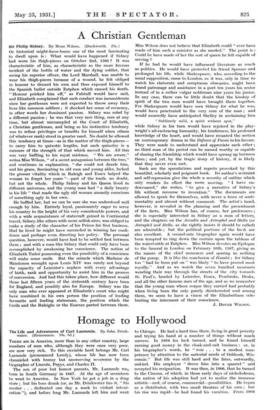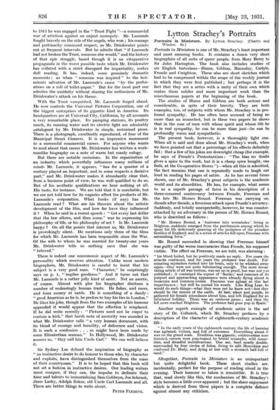Homage to Hollywood
The Life and Adventures of Carl Laemmle. By John Drink. water. (Heinemann. 10s. 6d.)
THERE are in America, more than in any other country, large numbers of men who, although they were once very poor, are now very rich. To this enviable herd belongs Mr. Carl Laemmle (pronounced Lemly), whose life has now been chronicled with breezy but unswerving reverence by the biographer of Lincoln, Pepys, and Charles II. '
The son of poor but honest parents, Mr. Laemmle was born in South Germany in 1867. At the age of seventeen he went to America. In New York he got a job in a drug store ; but his boss drank (or, as Mr. Drinkwater has it, " his master . . . dedicated one day a week to violent intoxi- cation "), and before long Mr. Laemmle left him and went to Chicago. He had a hard time there, living in great poverty and trying his hand at a number of things without much success. In 1894 his luck turned, and he found himself earning good money in the cloak-and-suit business : or, in his biographer's words, he " rose . . . to a modest com- petence by attention to the sartorial needs of Oshkosh, Wis- consin." But life was still hard and the fates, outwardly, unkind. His employer " drove him into a quarrel " and accepted his resignation. It was then, in 1906, that he turned to the Cinema, of which, in those early days of nickolodeons, the nation of his adoption had yet to realise the immense artistic—and, of course, commercial—possibilities. He began as a distributor, with- two small theatres of his own ; but his rise was rapid—he had found his vocation. From 1909
to 1915 he was engaged in the " Trust Fight "—a commercial war of attrition against an unjust monopoly. Mr. Laemmle fought bravely on the side of the angels, who won ; his courage and pertinacity command respect, as Mr. Drinkwater points out at frequent intervals. But he admits that " if Laemmle had not broken the Trust, someone else would," and the history of that epic struggle, based though it is on vituperative propaganda in the worst possible taste which Mr. Drinkwater has collated with a strict disregard for impartiality, makes dull reading. It has, indeed, some genuinely dramatic moments : as when " someone was inspired " to the last- minute salvation of Mr. Laemmle's cause " by the perfor- ations on a roll of toilet-paper." But for the most part one admires the assiduity without sharing the enthusiasm of Mr. Drinkwater's attack on his theme.
With the Trust vanquished, Mr. Laemmle forged ahead. He now controls the Universal Pictures Corporation, one of the biggest enterprises of its gigantic kind in America. Its headquarters are at Universal City, California, by all accounts a very remarkable place. Its pumping stations, its poultry ranch, its running water and its electric light are admirably catalogued by Mr. Drinkwater in simple, restrained prose. There is a photograph, excellently reproduced, of four of the Municipal Street Cleaners. It is an impressive monument to a successful commercial career. For anyone who wants to read about that career Mr. Drink-water has written a work- manlike biography on a note of warm but manly eulogy.
But there are notable omissions. In the organization of an industry which powerfully influences many millions of minds Mr. Laemmle, it appears, " has for a quarter of a century played an important, and in some respects a decisive part," and Mr. Drinkwater makes it abundantly clear that, from a business point of view, he was well qualified to do so. But of his aesthetic qualifications we hear nothing at all. His taste, for instance. We are told that it is unreliable, but we are not told how far its vagaries affect the products of Mr. Laemmle's corporation. What books (if any) has Mr. Laenunle read ? What are his theories about the artistic development of the film, and how far have they influenced it ? When he said in a recent speech : " Get every last dollar that the law allows, and then some," was he expressing his philosophy of life, or his philosophy of art ? Is Mr. Laemmle happy ? On all the points that interest us, Mr. Drinkwater is provokingly silent. He mentions only three of the films for which Mr. Laemmle has been responsible since the War. Of the wife to whom he was married for twenty-one years Mr. Drinkwater tells us nothing save that she was " beloved."
There is indeed one uneconomic aspect of Mr. Laemmle's personality which receives attention. Unlike most modern biographers, Mr. Drinkwater is careful to insist that his subject is a very good man. " Character," he surprisingly says on p. 1, " implies goodness." And it turns out that Mr. Laemmle is a rather jolly kind of saint. Not an ascetic, of course. Almost with glee his biographer discloses a number of endearingly human traits. He fishes, and races, and loses money at cards. He is something of a dandy : " good American as he is, he prefers to buy his ties in London." He likes his joke, though from the two examples of his humour appended it would appear that the affection is misplaced. If he did write recently : " Pictures need not be risque to contain a kick," that harsh note of austerity was sounded in what Mr. Drinkwater calls " a very human document, with its blend of courage and humility, of deference and vision. it is such a confession . . . as might have been made by some Elizabethan seaman." In Hollywood, Mr. Drinkwater assures us, " they call him Uncle Carl." We can well believe it.
Sir Sydney Lee defined the inspiration of biography as ." an instinctive desire to do honour to those who, by character and exploits, have distinguished themselves from the mass of their countrymen." It is to be hoped that this book will not set a fashion in instinctive desires. Our leading writers must conquer, if they can, the impulse to dedicate their time and talents to immortalizing. Sam Goldwyn, Joe Schenck, Jesse Lasky, Adolph Zukor, old Uncle Carl Laemmle and all. There are better things to write about.
PETER FIXATING.







































 Previous page
Previous page